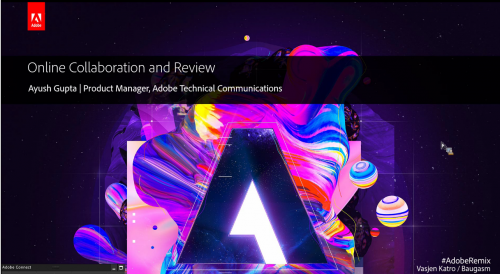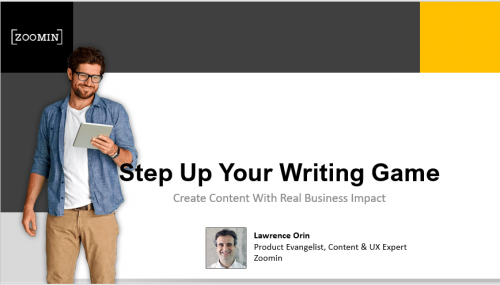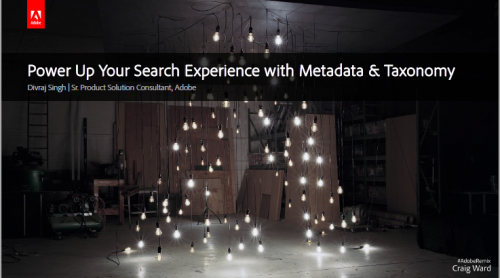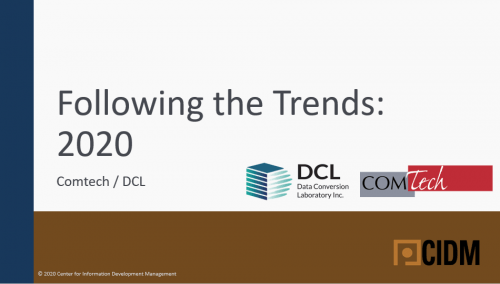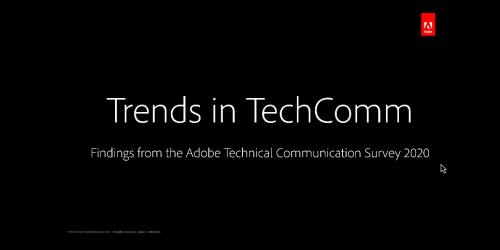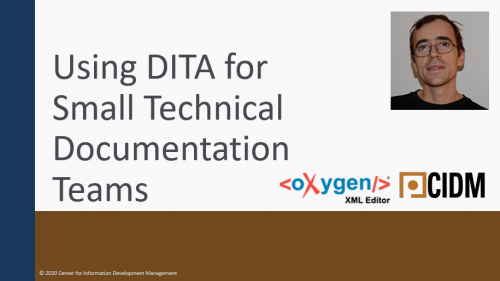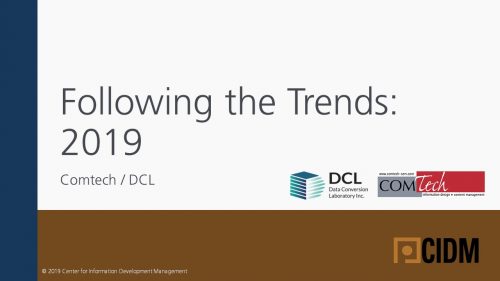- Why rethink about current review processes
- What are the benefits of adopting online review process for DITA content
- What are the basic tenets and features of an online review process
- A walkthrough of a typical collaborative review workflow and how to make it an experience for business users
-
June 10, 2020 Abstract World has seen a very different modus operandi in the last couple of months. This only emphasizes the fact that collaborating without physically being in the same space is fast becoming the norm where team members are either located in different geographical locations or are working from home. At this time, a smooth review and collaboration process for technical content can be a real boon to your organization. In this session, Ayush Gupta, Product Manager at Adobe, will discuss how organizations can transform their mundane, time consuming and cyclic review process into a more meaningful, error-free and productive collaboration experience for Content Creators and Subject Matter Experts (SMEs). Key takeaways:
-
June 3, 2020 In these difficult times, it’s absolutely critical to demonstrate your value to your organization. As a technical communicator, your mission is to make sure you’re getting the right information to the right people. Part of the solution is to find the right tools – but they will only take you so far. Good content is crucial. You must write content in a way that best suits your audience and best matches their search patterns, so they can organically surface the information they need. Join Lawrence Orin, Product Evangelist and Customer Implementation Expert at Zoomin, as he takes an intriguing look at content strategy, and reveals a down-to-earth, practical approach that will ensure your writing is making a visible impact on your company. In it this webinar, you’ll learn:
- Practical steps to improving your writing skills
- Best practices for structuring content
- How to tailor your writing to your audience
-
May 13, 2020 There is an explosion of content today. But what makes your content stand out is – relevance and searchability. To ensure that customers don’t have to spend hours searching through your content, metadata is key. And to know what metadata to add while authoring, a well-established taxonomy is key. To design a truly best-in-class content search experience metadata and taxonomy need to work in tandem. In this webinar we will showcase:
- How to leverage metadata to make your content searchable
- What is the difference between good and bad taxonomies
- A live example of taxonomy development using Adobe Experience Manager
-
May 12, 2020 In its eighth year of collecting data, the Center for Information-Development Management (CIDM) and Data Conversion Laboratory (DCL) asked managers, information architects, writers, training developers, and more how they are addressing the challenges of meeting customer information needs. During the webinar we walk through the results of the 2020 Trends Survey, a study we have been conducting since 2012. We trace the changes in how we think about developing and delivering content. Learn how others in the information-development community are planning to respond to new customer demands for innovative approaches to development and delivery. Presented by: Dawn Stevens, President, Comtech Services and Director of CIDM has 28 years of practical experience in virtually every role within a documentation and training department, including project management, instructional design, writing, editing, and multimedia programming. Dawn is the perfect advisor to identify and remove the challenges you face in producing usable, technical information and training content. With both engineering and technical communication degrees, Dawn combines her solid technical foundation with strong writing and design skills to lead our team of consultants and specialists in providing the expertise you need. Mark Gross, President, Data Conversion Laboratory, is a recognized authority on XML implementation and document conversion. Mark also serves as Project Executive, with overall responsibility for resource management and planning. Prior to joining DCL in 1981, Mark was with the consulting practice of Arthur Young & Co. Mark has a BS in Engineering from Columbia University and an MBA from New York University. He has also taught at the New York University Graduate School of Business, the New School, and Pace University. He is a frequent speaker on the topic of automated conversions to XML and SGML.
-
April 8, 2020 Technical Communication is in constant change: Requirements and expectations from both authors and consumers of technical content have changed dramatically over the last decade. The rise in digital experience innovation creates new customer expectations and demands. And enterprises around the world are exploring new ways to create new Content Interaction Experiences for their customers. In this presentation, Stefan Gentz will give insights from the Adobe Technical Communication Worldwide Survey 2019/2020. TechComm professionals from 60 countries participated in the survey. He will discuss the driving factors for enterprises around the world when it comes to technical communication. Why do companies choose to work with structured content, and why do they go for a CCMS? How do they deliver their content today – and how will they provide content tomorrow? KEY TAKEAWAYS
- Understand the key factors that are driving companies to move to structured content
- Understand which technologies companies use to author and deliver content today
- Know which are the “hottest” content delivery channels in the future to provide technical content to customers
-
April 1, 2020 Implementing DITA with a small team of technical writers does not have to be expensive or difficult to set up. We'll go through the steps of implementing a DITA solution using GitHub for storage and workflow and Oxygen XML Editor for editing. We'll also look into how you can automate publishing and receive feedback from your end users. As a practical example we'll look into how editing, collaboration and publishing on the Oxygen XML Blog works. Presented by: Radu Coravu started working more than 10 years ago as a software developer for Syncro Soft SRL, the manufacturer of the popular oXygen XML Editor. During the last years, his main focus has been in the development of the visual XML Author editing environment and the specific-DITA support provided by oXygen. He provides support for complex integrations and helps steer the product in the right direction, all this with some development on the side.
-
April 30, 2019 Consumers have more avenues than ever before to find the content they need. Are you trying to decipher how content trends are impacting your business? Do you need to respond to a rapidly changing digital marketplace? Join us to discover how changing content development and delivery requirements are affecting your business today. Learn how others in the information-development community are planning to respond to new customer demands for innovative approaches to development and delivery. In its seventh year of collecting data, the Center for Information-Development Management (CIDM) and Data Conversion Laboratory (DCL) asked managers, information architects, writers, training developers, and more how they are addressing the challenges of meeting customer information needs. During the webinar we walk through the results of the 2019 Trends Survey, a study we have been conducting since 2012. We trace the changes in how we think about developing and delivering content. Presented by: Dawn Stevens, President, Comtech Services and Director of CIDM has 28 years of practical experience in virtually every role within a documentation and training department, including project management, instructional design, writing, editing, and multimedia programming. Dawn is the perfect advisor to identify and remove the challenges you face in producing usable, technical information and training content. With both engineering and technical communication degrees, Dawn combines her solid technical foundation with strong writing and design skills to lead our team of consultants and specialists in providing the expertise you need. Mark Gross, President, Data Conversion Laboratory, is a recognized authority on XML implementation and document conversion. Mark also serves as Project Executive, with overall responsibility for resource management and planning. Prior to joining DCL in 1981, Mark was with the consulting practice of Arthur Young & Co. Mark has a BS in Engineering from Columbia University and an MBA from New York University. He has also taught at the New York University Graduate School of Business, the New School, and Pace University. He is a frequent speaker on the topic of automated conversions to XML and SGML.

